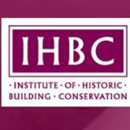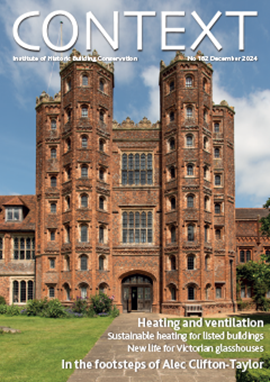Education, training and standards for 21st century conservation professionals
As the IHBC prepares to launch its Conservation Professional Practice Principles, the education secretary and the director of the institute set out how this new core document will help members to access the wide range of conservation skills they need today.
A professional body undertakes many activities to support its members: determining and regulating practice standards; sector advocacy, advice and public relations; managing professional disciplinary issues; and offering support, guidance and events to help access the discipline as well as to underpin continuing personal development (CPD). Of these the last is perhaps the one of most interest to many IHBC members. While the institute has been busy progressing all these areas over the last year, as other reports in the Yearbook indicate, the Education Training and Standards (ETS) committee has taken a hard look at our approach to training events in light of changing membership needs.
Perhaps the most important recent development is the IHBC’s production of Conservation Professional Practice Principles, which may be issued by the time you read this. The Principles underpin critical approaches to current member and sector support and the ETS committee sees substantial benefits arising from this new publication.
The ambition for the Principles is both to serve as a focus for the IHBC and to complement and offer balance to other principles, standards and practice guides. These include current guidance such as Historic England’s Conservation Principles and the relevant British Standard, BS 7913, as well as earlier publications such as the former Historic Scotland’s Memorandum of Guidance and the still well-regarded PPG 15 from England.
The statement is the product of a partnership-led approach to developing what will also serve as an internal practice standard, progressed with the agreement of three bodies which reflect our members’ primary areas of interest: the IHBC, as the lead professional body; the Historic Towns and Villages Forum, representing wider, non-specialist planning and corporate interests in the care of our historic places and Civic Voice, which reflects local community and client interest in heritage practice. Although it operates exclusively in England, Civic Voice encompasses the principles of community interest in historic places in general and, of course, principles are at the heart of this new document.
The Principles also serve as an overarching link to the IHBC’s more detailed and targeted practice guidance and support, such as that presented in our research notes and guidance notes, available through our online ‘Toolbox’ (http:// ihbconline.co.uk/toolbox), which we are continuing to develop and expand. This is in addition to the more substantial statements on policy available across our publications and embedded in our consultations, for example on heritage values, design, retrofit and local authority capacity.
As well as serving as a core document for future initiatives, Principles will help members understand and develop the wide range of conservation skills needed in line with our membership criteria and regulatory standards. This is an area that is particularly relevant to complex service delivery scenarios more typical of the private sector than our more familiar regulatory, public sector interests. This wider application is especially pertinent in the context of our 2017 annual school theme – infrastructure – and we will be making that point very strongly at the school itself.
This contemporary perspective marks a change from the old stereotypical view of the IHBC as being only focussed on the interests of the local authority conservation officer. With our membership profile now more in the private sector than the public and with ever-increasing connections across disciplines in modern practice, this new statement makes clear that our interdisciplinary standards are just as relevant to operations in large, development-focussed infrastructure projects as they are to the local, community and regulatory public planning services in which they originate. Accordingly, the new document should help members of HESPR, the IHBC’s highly respected heritage business listing to direct, shape and refine their services in the future.
Using the Principles, the ETS committee can guide the provision of members’ CPD support and help to shape events that deliver identified training skills needs. It enables our branches to integrate local training within a more national focus. In the past, the national committee has not been able to advise effectively on training priorities other than by reference to the occasional needs survey – certainly a useful aid, but infinitely more valuable if there is a practice statement against which to measure any results.
This responds to several issues that ultimately go back to our thinking on IHBC+ and the ‘experimental evolution’ of our operations in a way that can reflect the needs and capacity of our members in the 21st century:
- Reduced voluntary capacity, which means reducing demands on those individual members who assist the organisation, locally and nationally.
- A need for more flexible support to attain IHBC accreditation, focussed on the ‘stepping stones’ programme currently centred on associate membership.
- The capacity to support more diverse career paths across those working and interested in our conservation practice, mainly through reaching out more effectively to the diverse body of interests and players in heritage conservation, management and development.
As a first step to delivering the operational benefits provided by the Principles, the ETS committee is leading its first national training event in Bishop Auckland, Co Durham on 18-19 October. It is designed to deliver targeted project development and management skills while also being quality-assured like the annual school. Although it will be led by a national committee in terms of content and operations, it will be delivered in a partnership between the national office and the IHBC’s branch network, in this case the Northern branch.
In practical terms, we intend to use the complex range of projects and specialisms on offer in and around Bishop Auckland, from landscape and building to area-based projects and socio-economic works, to address recognised priority training needs for the IHBC’s members as well as targeted prospective members. These will entail:
Delivering training in line with recognised training priorities.
- Using BS 7913, as the most substantial development-sector statement on conservation practice and standards.
- Highlighting the close interfaces between conservation practice and project management.
Supporting skills and learning in line with the Areas of Competence and the IHBC’s Conservation Cycle, including building skills directly in line with the IHBC’s membership criteria and recognised CPD needs.
- Speakers will be encouraged to relate their content to these generic, but more easily recognisable, model areas of practice.
These developments demonstrate how the IHBC can help to address the multi-faceted conservation training needs in modern complex service provisions, not least the infrastructure projects that are at the heart of our 2017 annual school.
This article originally appeared in IHBC's 2017 Yearbook. It was written by Bridget Turnbull, education@ihbc.org.uk and Seán O’Reilly, director@ihbc.org.uk.
--Institute of Historic Building Conservation
Related articles on Designing Buildings Wiki
IHBC NewsBlog
SAVE celebrates 50 years of campaigning 1975-2025
SAVE Britain’s Heritage has announced events across the country to celebrate bringing new life to remarkable buildings.
IHBC Annual School 2025 - Shrewsbury 12-14 June
Themed Heritage in Context – Value: Plan: Change, join in-person or online.
200th Anniversary Celebration of the Modern Railway Planned
The Stockton & Darlington Railway opened on September 27, 1825.
Competence Framework Launched for Sustainability in the Built Environment
The Construction Industry Council (CIC) and the Edge have jointly published the framework.
Historic England Launches Wellbeing Strategy for Heritage
Whether through visiting, volunteering, learning or creative practice, engaging with heritage can strengthen confidence, resilience, hope and social connections.
National Trust for Canada’s Review of 2024
Great Saves & Worst Losses Highlighted
IHBC's SelfStarter Website Undergoes Refresh
New updates and resources for emerging conservation professionals.
‘Behind the Scenes’ podcast on St. Pauls Cathedral Published
Experience the inside track on one of the world’s best known places of worship and visitor attractions.
National Audit Office (NAO) says Government building maintenance backlog is at least £49 billion
The public spending watchdog will need to consider the best way to manage its assets to bring property condition to a satisfactory level.
IHBC Publishes C182 focused on Heating and Ventilation
The latest issue of Context explores sustainable heating for listed buildings and more.
















